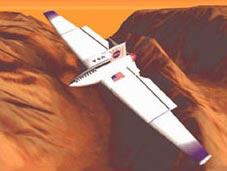Mars News
by Margarita Marinova
Recently NASA put out a request for teams to submit proposals to study various
Mars mission concepts which could be flown as part of the Mars Scout missions,
starting in 2007. The interest in these missions was clearly evident as 43 teams
submitted proposals. The ideas ranges from exploring the polar caps, to sending
missions which would fly through the atmosphere for prolonged periods of time,
to low-cost Mars sample return missions. A significant number of the proposals
suggested deploying balloons or planes on Mars, showing the great interest in
aerial observations of Mars.
Of the 43 submitted proposals, 10 were funded for further study. Some of these
are:
| |
 |
|
| |
MAGE
|
|
- KittyHawk: Professor Wendy Calvin, University of Nevada-Reno. A
mission involving three gliders would explore the composition and stratigraphy
of the walls of Valles Marineris in ways not possible for orbiters and landers.
- Urey: Dr. Jeff Plescia, U.S. Geological Survey, Flagstaff, AZ. A
surface rover would allow the absolute ages of geological materials to be
remotely determined for the first time on any planet.
- Pascal: Dr. Rob Haberle, NASA’s Ames Research Center, Moffett Field,
CA. A network of 24 weather stations on the martian surface would provide
more than two years of continuous monitoring of humidity, pressure and temperature
and other measurements.
- The Naiades: Dr. Bob Grimm, Blackhawk GeoServices, Golden, CO. Four
landers will search for subsurface liquid water using a novel low-frequency
sounding method.
- CryoScout: Dr. Frank Carsey, JPL. This mission, designed to use
heated water jets to descend through martian polar ice caps, could potentially
probe to depths of tens to hundreds of meters while measuring composition
and searching for organic compounds.
|

